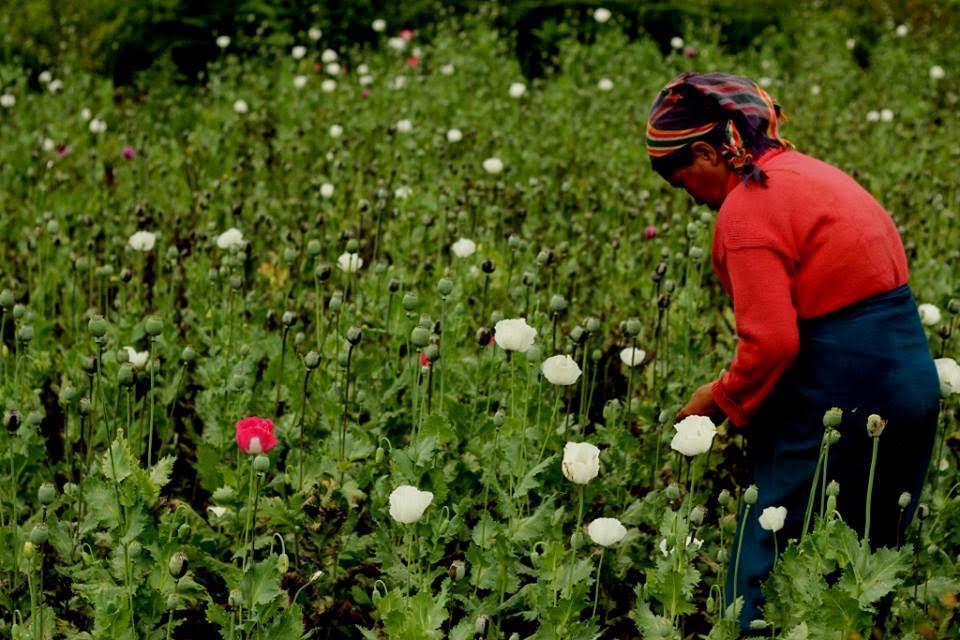Opium cultivation in the notorious ‘Golden Triangle’ region stabilised in 2015, yet the illegal industry remains one of the most profitable black-market revenue streams in the Asia-Pacific, the United Nations said on Tuesday.
Despite long-term transnational efforts to curtail the illicit substance trade, the region that includes intersecting parts of Burma, Laos and Vietnam still managed to produce some 823 metric tonnes of opium over the past year. Burma alone remains the second largest producer of the narcotic in the world, second only to Afghanistan, confirms a fresh report by the UN Office on Drugs and Crime (UNODC).
More than 140 representatives of drug enforcement agencies, international officials and public security experts gathered in Bangkok today to discuss strategies to counter the drug problem in the region.
“The production of opium and two-way trade of chemicals going in and heroin coming out of the Golden Triangle remains a clear challenge to the rule of law and stability of producing areas,” said Jeremy Douglas, a UNODC Regional Representative. He added that organised crime gangs are the ones taking the bulk of the profits, with the estimated the value of the drug trade in the Southeast Asian and Pacific region at more than US $33 billion per year – more than one third of the total value of organised crime in the area.
The focus placed by the UNODC on the criminal networks as the linchpins of the regional drug trade reinforced calls by the Myanmar Opium Farmers’ Forum to end the persecution of local growers. In a report also released on Tuesday, the grassroots organisation instead recommended legal protection for farmers and a regulation of the trade.
Crop substitution programmes were also recommended to support farmer’s transition to other crops such as coffee beans, a method that has had success in Thailand. Representatives from across Burma expressed a need for alternative development assistance to address the “problems of communities involved in opium cultivation”.
Conflict ridden Shan State is a hub of opium production and organised illegal trade and a place where a bleak cycle of poverty traps Burmese agricultural workers in the business of growing poppies.
The UN attributes some 91 percent of the entire Golden Triangle output originating from north of Burma’s largest ethnic state. Both the UN and the Myanmar Opium Farmers’ Forum identify socioeconomic factors as the driver for drug production in the country. For many families subsistence farming is the only method of making ends meet and can often be the difference between one or two meals a day for their children; particularly in areas besieged by civil war and a subsequently struggling local economy and job market.
The Forum’s report cites an interviewee describing the incomparable cash flow that opium generated compared other crops.
“We could easily solve our basic needs because of opium. It is also easy to store, carry and sell compared to other crops. Many local people also secure their livelihood by working in opium fields. In northern Shan state, a labourer could get 10,000 kyats (US $7.70) per day to work in an opium field which is more than double the income of a normal labourer,” said the unnamed farmer.
[related]
Other quoted farmers reported that the income from poppy farming allowed them to access primary healthcare services and education that would be otherwise unattainable. Despite the importance of the income for farmers, local authorities, police, the Burmese army and armed rebel groups use their positions of authority to skim the profits for their benefit, often referred to as a “tax”, the Myanmar Farmers’ Forum alleges.
Other times, local religious groups and armed ethnic organisations seek to eradicate the trade, but these methods often include eradicating a family’s source of income. Punitive treatment of users, including risky, cold-turkey withdrawal plans exacerbate the misery that drugs have cast over northern Burma.
One Ta’ang (Palung) farmer said: “If they [armed ethnic groups] arrest drug users, they punish them, and take them to their camps where they are asked to do manual labour and are kept until they stop using drugs.”
When the NLD comes to power next year, remedying the toxic mix of war, poverty, and crime in Burma’s Golden Triangle region should be of chief concern to the party, the UNODC believes.
No drug-action policies were outlined in the NLD election manifesto except for a youth-oriented goal to provide awareness and education to young people, to prevent the spread of drug-related health problems, the UNODC highlighted on Tuesday.



